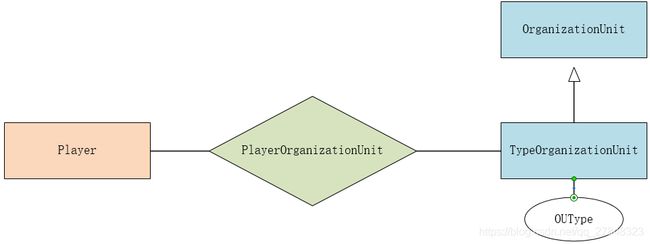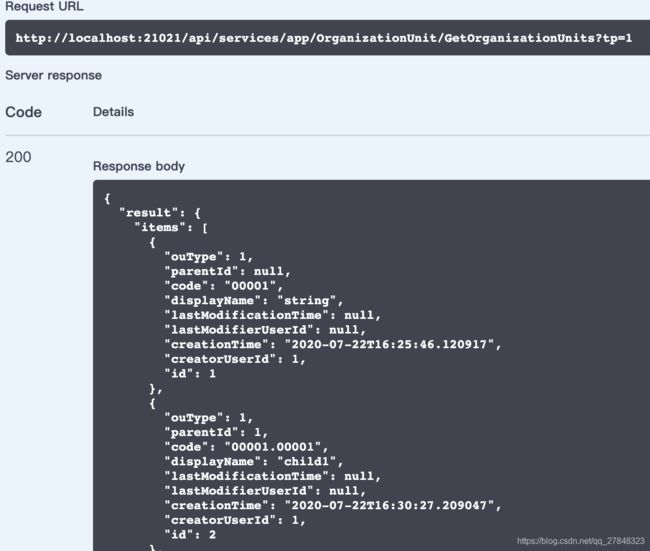Abp组织架构
在abp中,已有组织架构部分的接口,但是根据实际需要进行更改还是有必要。
终端实体类Player,联系集PlayerOrganizationUnit,组织架构类OrganizationUnit,派生自OrganizationUnit的TypeOrganiationUnit类添加属性OUType来区分不同的组织架构树。

实体Entity
[Table("NovelPlayer")]
public class Player : Entity<long>, IMustHaveTenant, IMustHaveOrganizationUnit
{
public string Title { get; set; }
public string DisplayName { get; set; }
public string MAC { get; set; }
public bool IsUsing { get; set; }
// IMustHaveTenant, IMustHaveOrganizationUnit
public int TenantId { get; set; }
public long OrganizationUnitId { get; set; }
}
[Table("NovelPlayerOrganizationUnit")]
[AutoMap(typeof(Player))]
public class PlayerOrganizationUnit : CreationAuditedEntity<long>, IMayHaveTenant, ISoftDelete
{
// player
public long PlayerId { get; set; }
public string Title { get; set; }
public string DisplayName { get; set; }
public string MAC { get; set; }
public bool IsUsing { get; set; }
// organizationUnit
public long OrganizationUnitId { get; set; }
// IMayHaveTenant, ISoftDelete
public bool IsDeleted { get; set; }
public int? TenantId { get; set; }
public PlayerOrganizationUnit() { }
public PlayerOrganizationUnit(int? tenantId, long playerId, long organizationUnitId)
{
TenantId = tenantId;
PlayerId = playerId;
OrganizationUnitId = organizationUnitId;
}
}
拓展组织架构类OrganizaitionUnit
public class TypeOrganizationUnit : OrganizationUnit
{
// 1-player,2-user
[Range(1, 100)]
public int OUType { get; set; }
public TypeOrganizationUnit()
{
}
//构造函数中添加OUType
public TypeOrganizationUnit(int tp, int? tenantId, string displayName, long? parentId = null)
: base(tenantId, displayName, parentId)
{
OUType = tp;
}
}
对应的Dto
[AutoMap(typeof(TypeOrganizationUnit))]
public class TypeOrganizationUnitDto : OrganizationUnitDto
{
public int OUType { get; set; }
public TypeOrganizationUnitDto()
{
}
}
EF Core
public DbSet<Player> Players { get; set; }
public DbSet<PlayerOrganizationUnit> PlayerOrganizationUnits { get; set; }
从上一篇派生类在EntityFramework Core中不生成表的探讨中可知,organizationUnit表中会新增一个OUType的类型。我们用这个字段来筛选出我们需要的组织架构成员

应用服务
//获取对应的组织架构树成员
public async Task<ListResultDto<TypeOrganizationUnitDto>> GetOrganizationUnits(int tp)
{
var query = from ou in _typeOrganizationUnitRepository.GetAll()
where ou.OUType == tp
select new
{
ou
};
var items = await query.ToListAsync();
return new ListResultDto<TypeOrganizationUnitDto>(
items.Select(item =>
{
var organizationUnitDto = ObjectMapper.Map<TypeOrganizationUnitDto>(item.ou);
return organizationUnitDto;
}).ToList());
}
//将终端添加入指定的组织架构中
public async Task AddPlayersToOrganizationUnit(PlayersToOrganizationUnitInput input)
{
foreach (var playerId in input.PlayerIds)
{
await _playerManager.AddPlayerToOrganizationUnitAsync(playerId, input.OrganizationUnitId);
}
}
//添加指定树的组织架构
public async Task<TypeOrganizationUnitDto> CreateOrganizationUnit(CreateOrganizationUnitInput input)
{
var organizationUnit = new TypeOrganizationUnit(AbpSession.TenantId, input.DisplayName, input.ParentId);
await _organizationUnitManager.CreateAsync(organizationUnit);
await CurrentUnitOfWork.SaveChangesAsync();
return ObjectMapper.Map<TypeOrganizationUnitDto>(organizationUnit);
}
领域层服务
这里我们比照UserManager在领域层写PlayerManager的服务
public virtual async Task<Player> GetPlayerByIdAsync(long playerId)
{
var player = await _playerRepositry.GetAsync(playerId);
if (player == null)
{
throw new AbpException("There is no player with id: " + playerId);
}
return player;
}
public virtual async Task AddPlayerToOrganizationUnitAsync(long playerId, long ouId)
{
await AddToOrganizationUnitAsync(
await GetPlayerByIdAsync(playerId),
await _typeOrganizationUnitRepositry.GetAsync(ouId)
);
}
public virtual async Task AddToOrganizationUnitAsync(Player player, TypeOrganizationUnit ou)
{
var currentOus = await GetOrganizationUnitsAsync(player);
if (currentOus.Any(cou => cou.Id == ou.Id))
{
return;
}
//await CheckMaxUserOrganizationUnitMembershipCountAsync(player.TenantId, currentOus.Count + 1);
await _playerOrganizationUnitRepository.InsertAsync(new PlayerOrganizationUnit(player.TenantId, player.Id, ou.Id));
}
[UnitOfWork]
public virtual Task<List<PlayerOrganizationUnit>> GetOrganizationUnitsAsync(Player player)
{
var query = from uou in _playerOrganizationUnitRepository.GetAll()
join ou in _typeOrganizationUnitRepositry.GetAll() on uou.OrganizationUnitId equals ou.Id
where uou.Id == player.Id
select uou;
return Task.FromResult(query.ToList());
}
